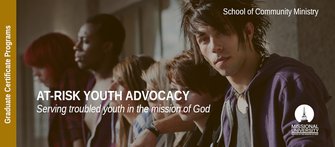
The focus of the Graduate Certificate in At-Risk Youth is working with and advocating for vulnerable/at-risk youth within the context of family and community settings. Students learn to examine the beliefs, values, and feelings of vulnerable youth from a risk and resiliency perspective. The program addresses social issues facing children and youth from diverse families and minority groups, social distress, disconnectivity, and issues of homelessness. Students evaluate human and community services and develop intervention approaches appropriate to various risk issues in the family and community.
Youth at-risk is a child or adolescent who faces extreme threats to a successful transition into adulthood. A variety of factors can contribute to a youth falling in the at-risk category including poverty, family instability, and dysfunction, unstable school environment, poor community resources, and adverse childhood experiences. When at-risk and troubled youth can’t transfer successfully into adulthood, local communities and businesses suffer, costing both millions of dollars. As adults, those with vulnerable backgrounds often develop problems with addiction, violence, self-harm, and substance abuse. Without intervention, many become the adults for whom local communities and governments spend millions on health care and criminal justice. The Graduate Certificate in At-Risk Youth Advocacy provides missional leaders with the background to serve and advocate for the physical, emotional, social as well as spiritual issues of this vulnerable population group.